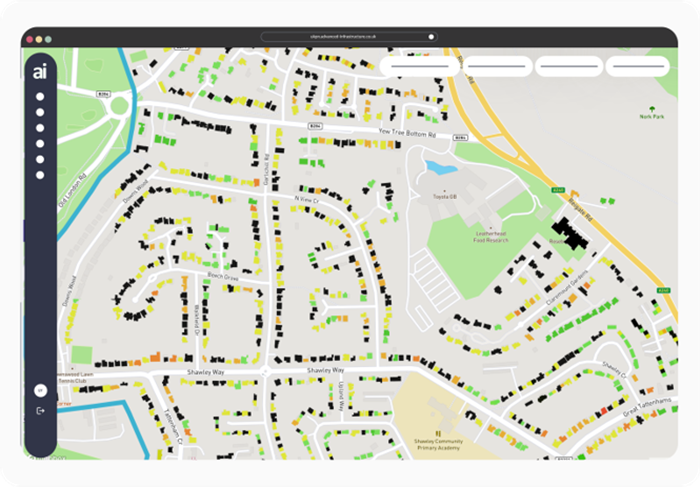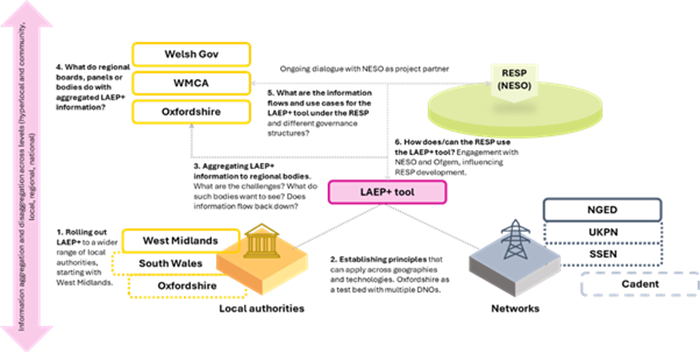A local area energy plan (LAEP) is a spatial plan, developed by a Local Authority, that identifies the energy implications of development projects and the changes needed to the local energy system and built environment to achieve net zero, detailing electricity, gas, and heat networks from a place perspective.
The plans will identify opportunities to reduce energy consumption, switch to lower carbon fuels and use flexibility mechanisms to use, for example, electricity at times when its carbon footprint is lowest. It will also help to identify areas where energy availability is stronger as a consideration in inward investment.
LAEPs are intended to:
- reduce risk for investors;
- ensure the underlying infrastructure is available to support decarbonisation and
- ensure best value outcomes for communities
The aims of our local area energy planning work are as follows:
- Broaden understanding of how to decarbonise the West Midlands and build internal support
- Bring together external stakeholders to collaborate and achieve net zero
- Inform decision making in local government, including local and transport plans
- Influence investment by energy networks
- Identify and prioritise local net zero projects and Energy Opportunity Areas
- Provide data to develop business cases and complete funding bids through LAEP+ - a digital mapping tool developed under the PRIDE project
Project PRIDE
Planning Regional Infrastructure in a Digital Environment (PRIDE) is an innovation project that explores how a digital tool can support more interactive energy and net zero planning for local authorities, energy networks and regions.
What is Project PRIDE building?
There are two main components of the PRIDE project: (1) the digital tool, and (2) a regional information-sharing and decision-making structure.

LAEP+ tool visualisation, for representation purposes only.
Further information about project PRIDE
Developed by Advanced Infrastructure Ltd, LAEP+ is a digital net zero planning tool for local authorities, networks and their delivery partners. Using hundreds of datasets, it allows users to create spatial energy plans for whole local authority areas or to develop specific net zero projects. Local authorities can also easily generate and share data with relevant partners to support energy planning and investment decisions.
Ofgem and NESO are currently working to instate a new layer of regional planning and governance in the energy system. To inform this process, PRIDE is developing regional information-sharing and decision-making processes enabled by the tool. These will bring together key local and regional stakeholders, where net zero planning and investment decisions can happen regionally. This will lay the groundwork for Regional Energy Strategic Plans (RESPs) once they come into play.
PRIDE Beta
We are now in the second or 'Beta' phase project. It has three main aims:
- Explore the use of a digital tool (LAEP+) to support local authorities in their energy planning activities, creating a ‘feedback loop’ to easily access and share data with energy networks.
- Understand how the digital tool and new information-sharing and decision-making frameworks can unlock local authority net zero ambitions.
- Understand how the tool and frameworks can support energy planning and investment at a regional level under the new Regional Energy Strategic Plan process.

What happens next?
The PRIDE project is bringing more Local Authorities from across the West Midlands on board.
By the end of January 2025, all of the participating LAs will have signed up to play an active part in the LAEP+ development process.
By the end of April 2025, all of the participating LAs will have undertaken a data audit, to help them understand the scale and scope of the “energy opportunities” the LAEP+ opens up.
All of the LAs will have access to map/ data sets for their respective areas.
By the end of October 2025, ten areas across the West Midlands will have produced “LAEP-style” plans.
As the UK accelerate its net zero ambitions, local places will have a critical role to play. Ensuring the transition reflects the needs of different people and places will be key to its success and enabling local authorities to progress their own net zero ambitions.
Our energy use is one the most significant elements of Net Zero, and there are ambitious national and local targets driving its decarbonisation. Local authorities are at the heart of this transition. Many are already exploring their own local energy plans, heat zoning arrangements or energy efficiency schemes., but it is clear that a consistent approach with common data sharing and governance structures is needed streamline these approaches.
Ofgem and the National Energy System Operator (NESO) are currently working to establish the first iteration of the Regional Energy Strategic Planning (RESP) process. Using data from local authorities, energy networks and other significant stakeholders, RESPs will set out whole-system visions for different regions across the country, charting a course for net zero delivery.
To ensure local authorities can meaningfully shape the regional planning process (and wider energy system planning and delivery) there is a need to ensure:
- local authorities have the right data and information-sharing processes in place, and
- regional information-sharing and decision-making can happen dynamically, with strong local representation.
Project PRIDE seeks to address these issues directly. This document sets out the key aims and detail of the PRIDE project and outlines the role we hope your local authority can play within it.
It is funded by Ofgem as part of the Strategic Innovation Fund programme. The project will run from November 2024 until October 2027.
Partners on the project are:
- West Midlands Combined Authority
- Advanced Infrastructure Ltd
- National Grid Electricity Distribution
- Regen
- National Energy System Operator (NESO)
This is the Beta phase of the project. In the Alpha phase, we worked with six WMCA local authorities to understand potential uses of the tool and to establish two new governance forums to support coordination of local and regional net zero planning. These were the Net Zero Infrastructure Delivery Panel (NZIPD) and the Local Area Energy Plan Coordination Group (LAEP-CG).
The digital tool element of the Beta phase will involve all WMCA local authorities onboarding to the LAEP+ tool and using it to develop plans and share data in practice. The regional element will aim to expand membership of the NZIDP and LAEP-CG groups with all WMCA local authorities. We will also seek opportunities to broaden this out to other regions, such as Wales and Oxfordshire, although these will be separate from the WMCA trial region.
PRIDE is aiming to provide a cost-effective, interactive way for local authorities to develop local energy plans which can easily be shared with networks and other local authority departments. This can support the development of new plans and projects, laying more robust groundwork for investment decisions.
With Regional Energy Strategic Planning coming into play, PRIDE will also equip participating local authorities with the relevant insights, expertise and capabilities to engage in local and regional strategic decision-making, ensuring they can play a leading role in the process.
To find to more, contact Energy Capital: energy.capital.wmca.org.uk
